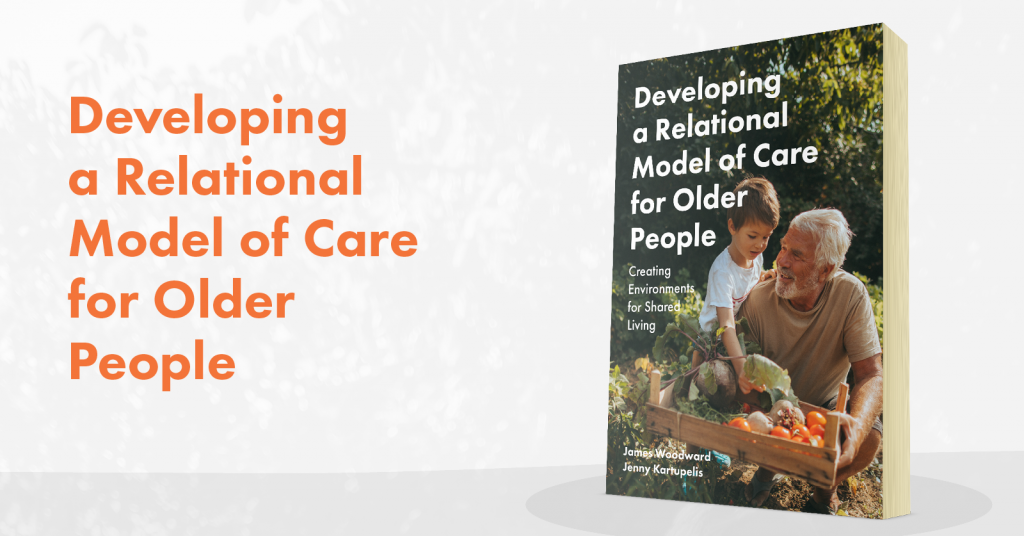Between 2014 and 2015, the Abbeyfield Society commissioned a survey on the spiritual life of their staff and residents. The findings were far more wide-ranging than we had expected, and we believe have profound implications for the future of residential care.
Developing a Relational Model of Care for Older People by James Woodward and Jenny Kartupelis enables this critical learning to be shared whilst proposing a revolutionary new approach based on nurturing particular types of relationships.
We found that the formation of family bonds and relationships in a home can give a great sense of support and security to all concerned, and most importantly that the family is a model for two-way relationships, based on mutual rather than uni-directional care giving.
When older people move into a new community – residential home, extra care or sheltered housing – they have an opportunity to start a new phase of ‘belonging’. But this can only be through relationships, and these in turn rely on the right environment, one that fosters feelings of dignity, security and mutual recognition. Good nutrition is also transformative, and regular shared meals bring people together, providing a structure to life.
Getting the balance right between ensuring company and privacy is very important to a sense of self- articulation. Making time for listening is vital, but sharing stories, like company, must be a choice. The most important thing is for trust to grow, to enable listening and talking.
This demands time and continuity, and a careful design of the built environment. People don’t want to live in beautiful hotels or hospitals, they want to live in homes that are fit for families, where they can know and be known, and remain close to a wider community of friends and relatives.
Nor do they necessarily want to talk about the past all the time. It is essential to mental well-being to look back at a life that has meaning and feels well lived. But this does not mean always looking backwards, as though there were nothing to look forward to. Whether the future is short or long, it can be positive.
Building a family is a development from the concept of providing a home. A family is based on bonds that grow and evolve, on interdependence and on acceptance of the good and less good characteristics of others.
Independence is supposed to be a blessing, and certainly giving choice and respecting individuality is essential in care homes. It is true that there must be freedom to express and be oneself, but independence can easily be another word for loneliness. At its worst, it drives the practice of encouraging the older person to linger on in a house no longer suited to their needs, relying on brief visits by rushed carers, and declining into a state of finding themselves in bed by 6pm with no access to a hot drink or the toilet.
Human beings are defined by inter-dependence, not independence. Gradually the capability to do everything for oneself fades, and then we must redefine accepted wisdom and offer the freedom to be rather than to do. People must know they are valued for who they are, and are enabled to contribute in ways that are still possible for them – this may well mean caring about their companions, staff and residents.
Sadly, the word ‘care’ (like ‘home’) has grown to hold many negative connotations in our society. The people I met talked about love. Love is found in all types of communication: listening, non-verbal, and particularly touch – when the interaction of caring for changes into caring about. We have to stop being afraid to use the word ‘love’, or we will simply not have any word left to describe the very basis of relationships that are spiritually transformative.
Right physical and relational environment; supported, trained and valued staff; time; good nutrition are the conditions that all enable loving care. These things cost money – but they save money further down the line, because they preserve mental and physical health. Can we be satisfied with anything less than a real change of attitude to national policy and practice? In fact, can we as a society afford not to make the radical shift?
In the end, the factors that make for elderly spiritual well-being are no different from those that make life happy and worthwhile for most of us. As one care home manager said: ‘Elderly people want the same as everyone else: a clean warm room, good food, and just somebody there for them’.
This blog is based on a speech delivered by author Jenny Kartupelis at the launch of the book Developing a Relational Model of Care for Older People on the 4th June 2018 , London.
Follow this link for more information or to buy a copy of Developing a Relational Model of Care for Older People .
For more content from our authors, why not follow us on Twitter @JKPDementia or Facebook @JKPDementia.